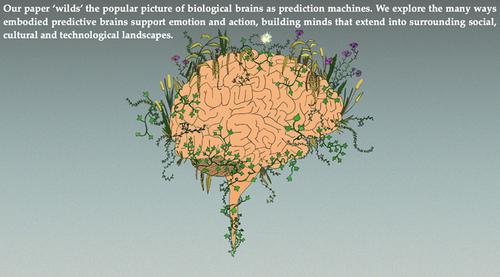当前位置:
X-MOL 学术
›
WIREs Cogn. Sci.
›
论文详情
Our official English website, www.x-mol.net, welcomes your
feedback! (Note: you will need to create a separate account there.)
Wilding the predictive brain.
WIREs Cognitive Science ( IF 3.2 ) Pub Date : 2020-09-09 , DOI: 10.1002/wcs.1542 Kathryn Nave 1 , George Deane 1 , Mark Miller 2 , Andy Clark 3
WIREs Cognitive Science ( IF 3.2 ) Pub Date : 2020-09-09 , DOI: 10.1002/wcs.1542 Kathryn Nave 1 , George Deane 1 , Mark Miller 2 , Andy Clark 3
Affiliation

|
The Predictive Processing (PP) framework casts the brain as a probabilistic prediction engine that continually generates predictions of the causal structure of the world in order to construct for itself, from the top down, incoming sensory signals. Conceiving of the brain in this way has yielded incredible explanatory power, offering what many believe to be our first glimpse at a unified theory of the mind. In this paper, the picture of the mind brought into view by predictive processing theories is shown to be embodied, deeply affective and nicely poised for cognitive extension. We begin by giving an overview of the main themes of the framework, and situating this approach within embodied cognitive science. We show perception, action, homeostatic regulation and emotion to be underpinned by the very same predictive machinery. We conclude by showing how predictive minds will increasingly be understood as deeply interwoven with, and perhaps extended into, the surrounding social, cultural and technological landscape.
中文翻译:

疯狂地预测大脑。
预测处理(PP)框架将大脑作为概率预测引擎投放,该引擎不断生成世界因果结构的预测,以便自上而下构造传入的感觉信号。以这种方式构想的大脑已经产生了令人难以置信的解释力,许多人认为这是我们对统一的心理理论的第一印象。在本文中,预测性加工理论将人的心灵形象展现出来,体现出来,具有深深的情感影响,并且很容易进行认知扩展。我们首先概述框架的主要主题,然后将这种方法置于体现的认知科学中。我们显示出感知,动作,体内稳态调节和情感将由相同的预测机制所支撑。
更新日期:2020-10-11
中文翻译:

疯狂地预测大脑。
预测处理(PP)框架将大脑作为概率预测引擎投放,该引擎不断生成世界因果结构的预测,以便自上而下构造传入的感觉信号。以这种方式构想的大脑已经产生了令人难以置信的解释力,许多人认为这是我们对统一的心理理论的第一印象。在本文中,预测性加工理论将人的心灵形象展现出来,体现出来,具有深深的情感影响,并且很容易进行认知扩展。我们首先概述框架的主要主题,然后将这种方法置于体现的认知科学中。我们显示出感知,动作,体内稳态调节和情感将由相同的预测机制所支撑。











































 京公网安备 11010802027423号
京公网安备 11010802027423号